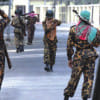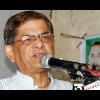HC Judge's Observation on BDR Mutiny: Plot to destabilise country, govt
The 2009 BDR mutiny had posed a serious challenge to the 48-day-old government and a grave threat to democracy and the rule of law, a High Court judge observed yesterday while delivering the verdict in the sensational BDR carnage case.
Showing disregard for the rule of law, the mutineers had engaged themselves in a conspiracy to destabilise the country by killing 74 unarmed people at the Pilkhana BDR headquarters on February 25-26, Justice Md Abu Zafor Siddique said in his observation.
The main target of the mutiny was to "push the newly elected democratic government led by Prime Minister Sheikh Hasina into instability", "damage the country's internal security and stability" and "hamper Bangladesh's participation in the UN peacekeeping mission", he said.
Justice Zafor is one of the three judges of the special HC bench which started delivering the verdict yesterday on the death reference and appeals in the biggest criminal case in the country's history in terms of the number of accused and convicts.
The pronouncement of the judgment is likely to be completed today.
Justice Md Shawkat Hossain, who heads the bench, said all the three judges are unanimous in the verdict.
Justice Md Nazrul Islam Talukder is the other member of the panel.
"All the 850 people [the charge-sheeted accused in the case] except for the departed souls are anxiously waiting for the moment, the announcement [of the verdict]," Justice Shawkat said, adjourning the proceedings till today morning.
Seventy-four people, including 57 army officials, were massacred during the BDR mutiny at the Pilkhana headquarters of the paramilitary force, later renamed Border Guard Bangladesh (BGB).
The death reference and the appeals were filed with the HC months after a Dhaka court on November 5, 2013, awarded death sentence to 150 BDR members and two civilians, and life imprisonment to 160 others for their roles and involvement in the carnage.
The Dhaka court also handed down rigorous imprisonment to 256 people, mostly BDR soldiers. It acquitted the remaining 278 accused, but the government later appealed against the acquittal of 69 of them.
The HC started hearing the death reference and appeals from the convicts in January, 2015.
Yesterday, the three-member bench sat in a jam-packed courtroom at 10:55am to give the verdict. A number of relatives of the accused BDR members waited outside the court amid tight security.
In his opening remarks, Justice Shawkat said the Pilkhana carnage had created a dangerous and scary situation in the country.
He said such a huge number of army officials had not been killed even during the 1971 Liberation War.
"It [the Pilkhana massacre] was a mass killing. The worthy sons of the soil were brutally murdered on that day. Today we are remembering them and expressing our deep condolence," he said.
This is a historic verdict for the country's judiciary, said the judge.
After the opening remarks, Justice Zafor gave his observation.
Terming the killings barbaric and unprecedented, he said any such incident of killing 57 army officials in such a short time cannot be found in world history.
By carrying out the massacre, the mutineers created a disgraceful chapter and posed a threat to the country's independence and sovereignty, he said.
Justice Zafor noted that the leadership of the over 218-year-old paramilitary force has been at the hands of the armed forces. Gradually, a distance was created between ordinary jawans and army officials over dignity, discipline and issues relating to their interests.
"A mentality of not accepting the authority of army officials had silently grown among the BDR members," he said, adding that the ordinary jawans, including the new ones, had been provoked and mislead by some ambitious BDR divisional members.
The judge said the mutineers had been hatching a conspiracy which took the final turn at the Pilkhana BDR headquarters at 9:30am on February 25 in 2009.
Apart from the murders, the commission of several other heinous crimes had thrown the existence of the disciplined paramilitary force into jeopardy, he mentioned.
The judge further said the mutineers wanted to have their demands met at any cost -- by holding the army officials hostage and resorting to torture and murder, if necessary, to discourage army officials from working for the BDR on deputation in future.
They aimed to make the disciplined force ineffective by destroying its chain of command, push the newly-elected democratic government into instability by putting the army and the BDR on a path of confrontation, damage the country's internal security and stability, tarnish Bangladesh's image in the world and hamper the country's participation in the UN peacekeeping mission, he pointed out.
Led by the then BDR Deputy Assistant Director (DAD) Towhid, BDR members, including DAD Nasir, Mirza Habibur Rahman, Jalil, Rahim, Sepoy Selim Reza, and other mutineers tortured and killed army officials and their family members, he said.
The mutineers also torched their homes and vehicles, looted valuables and committed other heinous crimes in a planned way.
The accused assembled illegally, looted arms and ammunition by breaking into the armoury, and brutally killed 74 people, including the then BDR director general Maj Gen Shakil Ahmed, his wife Naznin Shakil and 56 other unarmed army officials, noted Justice Zafor.
"Even women, children and house helps were not spared from their brutality."
With intent to hide the bodies, the mutineers buried most of those in a mass grave near the BDR hospital mortuary and MT garage, and also threw some bodies into manhole and sewer pipes, he said.
They didn't stop even after killing the army officials. They burned some of the bodies with petrol and also used bayonets to deform their faces, the judge mentioned.
Lauding PM Sheikh Hasina's role in tackling the mutiny, he said the premier as the head of the newly elected government took logical steps with patience, courage and prudence to check the mutiny.
Talking to reporters, Attorney General Mahbubey Alam said, "It was one of the monstrous crimes in history. The verdict and the case as well will become a precedent."
The HC bench held hearing on the death reference and the appeals for 370 days.


 For all latest news, follow The Daily Star's Google News channel.
For all latest news, follow The Daily Star's Google News channel. 








Comments